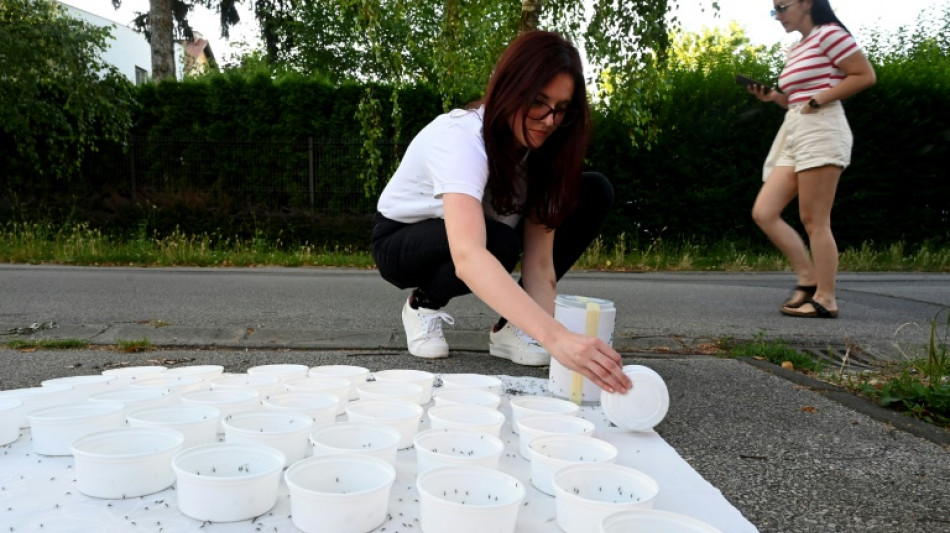
-
 German exports to US plunge as tariffs exact heavy cost
German exports to US plunge as tariffs exact heavy cost
-
Portugal heads for presidential vote, fretting over storms and far-right

-
 Suicide blast at Islamabad mosque kills at least 30, wounds over 130: police
Suicide blast at Islamabad mosque kills at least 30, wounds over 130: police
-
Russia says Kyiv behind Moscow shooting of army general

-
 Greenland villagers focus on 'normal life' amid stress of US threat
Greenland villagers focus on 'normal life' amid stress of US threat
-
Iran, US hold talks in Oman after Trump military threats

-
 Stocks waver as tech worries build
Stocks waver as tech worries build
-
Dupont, Jalibert click to give France extra spark in Six Nations bid

-
 'Excited' Scots out to prove they deserve T20 World Cup call-up
'Excited' Scots out to prove they deserve T20 World Cup call-up
-
EU tells TikTok to change 'addictive' design

-
 India captain admits 'there will be nerves' at home T20 World Cup
India captain admits 'there will be nerves' at home T20 World Cup
-
Stellantis takes massive hit for 'overestimation' of EV shift

-
 'Mona's Eyes': how an obscure French art historian swept the globe
'Mona's Eyes': how an obscure French art historian swept the globe
-
Iran, US hold talks in Oman

-
 Iran, US hold talks in Oman after deadly protest crackdown
Iran, US hold talks in Oman after deadly protest crackdown
-
In Finland's forests, soldiers re-learn how to lay anti-personnel mines

-
 Israeli president visits Australia after Bondi Beach attack
Israeli president visits Australia after Bondi Beach attack
-
In Dakar fishing village, surfing entices girls back to school

-
 Lakers rally to beat Sixers despite Doncic injury
Lakers rally to beat Sixers despite Doncic injury
-
Russian pensioners turn to soup kitchen as war economy stutters

-
 Japan taps Meta to help search for abuse of Olympic athletes
Japan taps Meta to help search for abuse of Olympic athletes
-
As Estonia schools phase out Russian, many families struggle

-
 Toyota names new CEO, hikes profit forecasts
Toyota names new CEO, hikes profit forecasts
-
Next in Putin's sights? Estonia town stuck between two worlds

-
 Family of US news anchor's missing mother renews plea to kidnappers
Family of US news anchor's missing mother renews plea to kidnappers
-
Spin woes, injury and poor form dog Australia for T20 World Cup

-
 Japan's Liberal Democratic Party: an election bulldozer
Japan's Liberal Democratic Party: an election bulldozer
-
Hazlewood out of T20 World Cup in fresh blow to Australia

-
 Japan scouring social media 24 hours a day for abuse of Olympic athletes
Japan scouring social media 24 hours a day for abuse of Olympic athletes
-
Bangladesh Islamist leader seeks power in post-uprising vote

-
 Rams' Stafford named NFL's Most Valuable Player
Rams' Stafford named NFL's Most Valuable Player
-
Japan to restart world's biggest nuclear plant

-
 Japan's Sanae Takaichi: Iron Lady 2.0 hopes for election boost
Japan's Sanae Takaichi: Iron Lady 2.0 hopes for election boost
-
Italy set for 2026 Winter Olympics opening ceremony

-
 Hong Kong to sentence media mogul Jimmy Lai on Monday
Hong Kong to sentence media mogul Jimmy Lai on Monday
-
Pressure on Townsend as Scots face Italy in Six Nations

-
 Taiwan's political standoff stalls $40 bn defence plan
Taiwan's political standoff stalls $40 bn defence plan
-
Inter eyeing chance to put pressure on title rivals Milan

-
 Arbeloa's Real Madrid seeking consistency over magic
Arbeloa's Real Madrid seeking consistency over magic
-
Dortmund dare to dream as Bayern's title march falters

-
 PSG brace for tough run as 'strange' Marseille come to town
PSG brace for tough run as 'strange' Marseille come to town
-
Japan PM wins Trump backing ahead of snap election

-
 AI tools fabricate Epstein images 'in seconds,' study says
AI tools fabricate Epstein images 'in seconds,' study says
-
Asian markets extend global retreat as tech worries build

-
 Sells like teen spirit? Cobain's 'Nevermind' guitar up for sale
Sells like teen spirit? Cobain's 'Nevermind' guitar up for sale
-
Thailand votes after three prime ministers in two years

-
 UK royal finances in spotlight after Andrew's downfall
UK royal finances in spotlight after Andrew's downfall
-
Diplomatic shift and elections see Armenia battle Russian disinformation

-
 Undercover probe finds Australian pubs short-pouring beer
Undercover probe finds Australian pubs short-pouring beer
-
Epstein fallout triggers resignations, probes


Croatia targets latest climate-change threat: mosquitoes
Hordes of buzzing but sterile mosquitoes are being let loose in Zagreb as Croatia gets ahead of worries that climate change could bring tropical diseases to the Mediterranean nation.
The release is part of a pilot project focused on eradicating invasive Asian Tiger mosquitoes known for carrying sicknesses like Dengue Fever, Chikungunya and Zika.
The species has appeared to thrive in the country and across the region in recent years due in part to climate change -- with the warmer weather providing fertile ground for the mosquito.
"It's too early to say whether this one will yield results," Zagreb resident Kruno Lokotar told AFP. "But I'm glad that we are not just sticking with spraying."
Croatia's effort centres on a method that uses sterilised male mosquitoes -- which once released into the wild will mate with females and neutralise the potential for future offspring.
The Zagreb project kickstarted in June, when 100,000 mosquitoes were released in a high-risk area with thick foliage where mosquitoes often congregate.
"If we release a sufficient number of sterile males during a certain period in an area, the mosquito population in that area will decrease," Ana Klobucar, a medical entomologist of the Zagreb-based teaching institute of public health who is overseeing the project, told AFP.
The plan is rooted in the Sterile Insect Technique (SIT) -- a method that has been used for decades across the world to combat various harmful insects, but is still being tested for its effectiveness against mosquitoes in urban areas.
Croatia started using it for mosquitoes last year in northern Istria peninsula.
This year a total of 1.2 million specially treated insects will be released there over a three-month period, entomologist Nediljko Landeka of the regional public health institute told AFP.
- Climate change impact -
The insects -- which have been rendered sterile after exposure to gamma rays -- are sourced from a laboratory in Italy, and shipped 500 kilometres (310 miles) to Croatia in special boxes.
Once received, Klobucar and her assistants carefully remove plastic bowls with the insects from cardboard tubes before they are later dispersed in local gardens in the target area.
Croatia's programme coincides with increasingly dire warning from experts that global warming could make swaths of Europe more vulnerable to infectious diseases spread by mosquito bites.
The presence of the Asian Tiger mosquito in Croatia was first recorded in 2004 after arriving in Europe in the late 1970s, with experts suggesting they made the journey in used tyres that arrived in Albania from China.
The breed has now spread to more than a dozen European countries, with the Mediterranean region having been hit the hardest, according to official figures.
As the mercury rises across the globe, the Asian Tiger mosquito is moving further north including in areas that were considered too cold for the species to thrive, including in Switzerland and Germany.
"We are afraid that together with the species, viruses could also easily adapt in the future to new environments," warned Greek entomologist Antonios Michaelakis.
Michaelakis -- who is also a researcher at the Benaki Phytopathological Institute in Athens -- has been instrumental in sharing his experiences from a programme in Greece with his Croatian counterparts.
In Greece in 2019, the project succeeded in slashing the population of Asian Tiger mosquitoes by 90 percent, he told AFP.
During a trial of the technique last year in Croatia's Istria, up to 14 percent of mosquito eggs in the area were found to be sterile and jumped to nearly 60 percent this year, Landeka added.
M.AbuKhalil--SF-PST



